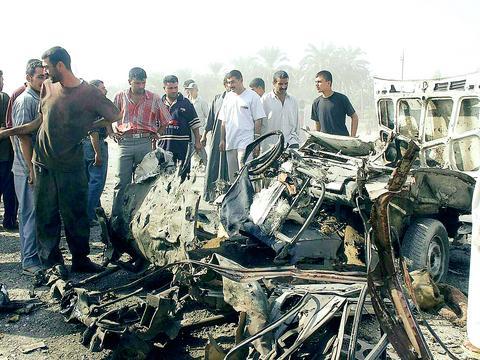An estimated 100,000 civilians have died in Iraq as a direct or indirect consequence of last year's US-led invasion, according to a new study by a research team at the Bloom-berg School of Public Health at Johns Hopkins University in Baltimore.
Coming just a few days before the presidential election the finding is certain to generate intense controversy, since it is far higher than previous mortality estimates for the Iraq conflict.

PHOTO: EPA
Editors of The Lancet, the London-based medical publication, where an article describing the study is scheduled to appear, decided not to wait for the normal publication date next week, but to place the research online yesterday, apparently so it could circulate before the election.
The Bush administration has not estimated civilian casualties from the conflict, and independent groups have put the number at most in the tens of thousands.
In the study, teams of researchers led by Dr. Les Roberts fanned out across Iraq in the middle of last month to interview nearly 1,000 families in 33 locations. Families were interviewed about births and deaths in the household before and after the invasion.
Although the authors acknowledge that thorough data collection was difficult in what is effectively still a war zone, the data they managed to collect is extensive. Using what they described as the best sampling methods that could be applied under the circumstances, they found that Iraqis were 2.5 times more likely to die in the 17 months following the invasion than in the 14 months before it.
Before the invasion, the most common causes of death in Iraq were heart attacks, strokes, and chronic diseases. Afterward, violent death was far ahead of all other causes.
"We were shocked at the magnitude but we're quite sure that the estimate of 100,000 is a conservative estimate," said Dr. Gilbert Burnham of the Johns Hopkins team.
Burnham said the team excluded data about deaths in Fallujah in making their estimate, because that city was the site of unusually intense violence.
In 15 of the 33 communities visited, residents reported violent deaths in their families since the conflict started.
They attributed many of those deaths to attacks by US-led forces, mostly airstrikes, and most of those killed were women and children. The risk of violent death was 58 times higher than before the war, the researchers reported.
The team included researchers from the Johns Hopkins Center for International Emergency, Disaster and Refugee Studies, which has conducted similar mortality studies about North Korea and Congo.
It also included doctors from Al Mustansiriya University Medical School in Baghdad.
There is bound to be skepticism about the estimate of 100,000 excess deaths, since that translates into an average of 166 deaths a day since the invasion.
But some people were not surprised.
"I am emotionally shocked but I have no trouble in believing that this many people have been killed," said Scott Lipscomb, an associate professor at Northwestern University, who works on the www.iraqbodycount.net project.
That project, which collates only deaths reported in the news media, currently put the maximum civilian death toll at just under 17,000.
"We've always maintained that the actual count must be much higher," Lipscomb said.

Incumbent Ecuadoran President Daniel Noboa on Sunday claimed a runaway victory in the nation’s presidential election, after voters endorsed the young leader’s “iron fist” approach to rampant cartel violence. With more than 90 percent of the votes counted, the National Election Council said Noboa had an unassailable 12-point lead over his leftist rival Luisa Gonzalez. Official results showed Noboa with 56 percent of the vote, against Gonzalez’s 44 percent — a far bigger winning margin than expected after a virtual tie in the first round. Speaking to jubilant supporters in his hometown of Olon, the 37-year-old president claimed a “historic victory.” “A huge hug

Two Belgian teenagers on Tuesday were charged with wildlife piracy after they were found with thousands of ants packed in test tubes in what Kenyan authorities said was part of a trend in trafficking smaller and lesser-known species. Lornoy David and Seppe Lodewijckx, two 19-year-olds who were arrested on April 5 with 5,000 ants at a guest house, appeared distraught during their appearance before a magistrate in Nairobi and were comforted in the courtroom by relatives. They told the magistrate that they were collecting the ants for fun and did not know that it was illegal. In a separate criminal case, Kenyan Dennis

A judge in Bangladesh issued an arrest warrant for the British member of parliament and former British economic secretary to the treasury Tulip Siddiq, who is a niece of former Bangladeshi prime minister Sheikh Hasina, who was ousted in August last year in a mass uprising that ended her 15-year rule. The Bangladeshi Anti-Corruption Commission has been investigating allegations against Siddiq that she and her family members, including Hasina, illegally received land in a state-owned township project near Dhaka, the capital. Senior Special Judge of Dhaka Metropolitan Zakir Hossain passed the order on Sunday, after considering charges in three separate cases filed

APPORTIONING BLAME: The US president said that there were ‘millions of people dead because of three people’ — Vladimir Putin, Joe Biden and Volodymyr Zelenskiy US President Donald Trump on Monday resumed his attempts to blame Ukrainian President Volodymyr Zelenskiy for Russia’s invasion, falsely accusing him of responsibility for “millions” of deaths. Trump — who had a blazing public row in the Oval Office with Zelenskiy six weeks ago — said the Ukranian shared the blame with Russian President Vladimir Putin, who ordered the February 2022 invasion, and then-US president Joe Biden. Trump told reporters that there were “millions of people dead because of three people.” “Let’s say Putin No. 1, but let’s say Biden, who had no idea what the hell he was doing, No. 2, and